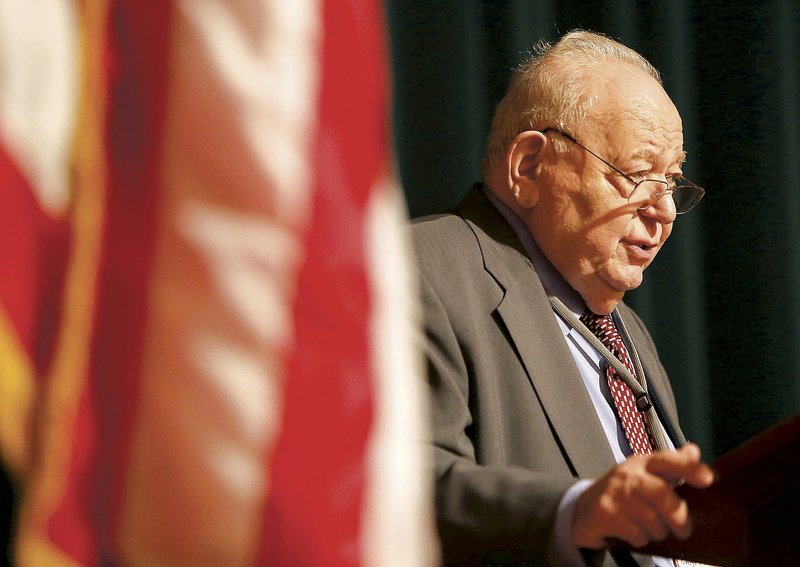SPRINGDALE -- George Abraham, a Jewish man who lives in Florida, was just 12 years old when he found himself alone, without his parents or two brothers, in a concentration camp in German-occupied Poland.
"My father told me I had to survive," Abraham said. He believes that's why he did.
George Abraham
• Born in 1931 in Targu Mures, Romania
• Family deported to Auschwitz in May 1944
• Parents and two brothers murdered in concentration camps
• Abraham liberated in May 1945 by U.S. Army
• Retired vice president of Carnival Cruise Lines
• Married to Cela Abraham for 62 years
• Two daughters, four grandchildren
• Resident of Cooper City, Fla.
Source: George Abraham
Abraham, 84, was invited to speak to nearly 430 middle and high school students Friday at the annual Holocaust Conference held at the Jones Center in Springdale. The conference was organized by 16 volunteers who are part of the Arkansas Holocaust Education Committee.
Abraham said the Holocaust was one of the most civilized nations in Europe committing one of the worst mass murders in history. The targets were Jews and other groups the Nazis didn't like.
"What I think that is important for you, especially the young people among us here, is to not forget what hatred can do," he said.
The National Holocaust Memorial Museum in Washington describes the Holocaust as the German Nazi-led regime's systematic, state-sponsored persecution and execution of 6 million Jews during World War II.
Millions of Jews from Germany, its occupied territories and its allies were deported from 1941-44 to ghettos, or segregated areas, and concentration camps, where they were killed in gas chambers. German authorities also targeted disabled people, Jehovah's Witnesses and homosexuals, according to the museum.
German military forces finally surrendered to Allied forces in May 1945.
One of the organizers of Friday's conference was retired educator Grace Donoho, who grew up among Holocaust survivors in a predominantly Jewish neighborhood in Chicago. When her family moved to Northwest Arkansas, she was disappointed at how little her children were learning about the Holocaust in school. A University of Arkansas faculty member challenged her to take action, she said.
A Holocaust survivor is invited to speak at each conference.
"To hear a survivor share in their own words what they experienced is just incredible," Donoho said.
Abraham said the horrors and sufferings of the Holocaust cannot be forgiven.
He was born to a middle-class Jewish family in a town in Romania that was part of Hungary from 1940-45, he said. His father, Edmond Abraham, was a small-business owner. His mother, Roberta, was an office manager, who could speak and write in several languages.
He was the couple's middle child -- between Emeric, who was seven years older, and Andrei, who was 16 months younger.
Abraham was in the seventh grade when the Germans began to occupy Hungary in March 1944. Soon after, the Jews began losing the freedoms they had previously enjoyed, Abraham said. He remembered the morning when police went house to house, forcing residents -- including his family -- to leave with only what belongings they could carry.
They were taken first to a ghetto, and then were sent in May 1944 to a railroad station. There, they were crowded into small railroad cars, each packed with 80-90 people. They shared a few buckets for water and a few buckets for "toilets," and had no room to lie down. The trip to Auschwitz took four or five days, he said.
Once at Auschwitz, men and women were separated, Abraham said. Young boys were sent with the women. At first, Abraham went with his mother and younger brother.
"I was beat, kicked," Abraham said. "I looked big and strong."
So, he was sent to join the men and was reunited with his father. His mother and little brother went immediately to the gas chambers, he said.
He was asked to work at the camp. He remembers his father forcing him to eat the food, a watery mixture unfit for consumption. Abraham said his father insisted that he stay strong and survive.
After a few days, Abraham was separated from his father and older brother, who were sent to a concentration camp in Germany. Before they were separated, they agreed to meet in their hometown when the war ended, but Abraham's father and brother never returned. He later learned that the Germans shot them during a forced march a few weeks before they would have been liberated.
Abraham was selected for the gas chambers three times. Twice he escaped, and the third time he was returned to camp, he said. A few weeks before the Russians liberated the Auschwitz camp, he was among prisoners ordered to take the "death march" from Auschwitz to Mauthausen in Poland. The march took three weeks, he said. Those who weren't able to continue walking were shot and left in the middle of the road.
Mauthausen was liberated by the U.S. Army in May 1945.
Abraham remembers seeing his reflection in a window at that time.
"I saw a skeleton like a dead man standing there," he said.
Abraham remained at Mauthausen for a month and then began the journey home, he said. The only other family member he could find was an uncle.
In 1954, Abraham married his wife, Cela, in Romania. They migrated to Israel in 1961 and then to Florida in 1978. He and his wife had two daughters who grew up never knowing their grandparents, Abraham said.
He returned to Auschwitz in 1995 with his family and visited the symbolic burial site of his parents.
"All of this happened because of hatred," he said.
Metro on 11/07/2015


